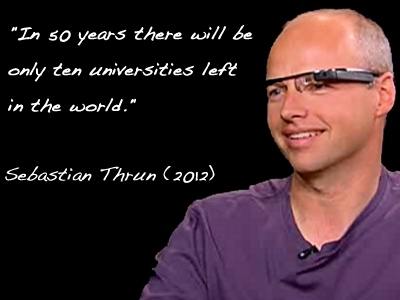MOOCs are doomed: The provocative motion of this year’s ONLINE EDUCA BERLIN debate
Massive Open Online Courses have made huge waves in the education sector over the last few years. Their firmest supporters have consistently claimed that the MOOC is set to change everything we know about education; their opponents, however, are only too ready to point out the economic flaws, the low completion rates, and paint the entire phenomenon as a result of media hype.
All that is certain is that this year’s debate could well be one of the most fiercely argued to date.
Taking the floor will be:
- Prof Pierre Dillenbourg, Professor of Learning Technologies, Swiss Federal Institute of Technology, Lausanne (EPFL) and Academic Director of the Center for Digital Education, Switzerland
- Johannes Heinlein, Senior Director Strategic Partnerships, edX, USA
- Crispin Weston, Ed-Tech Consultant and Blogger, SALTIS, BSI’s Expert Committee Following IT for Learning, Education and Training, UK
- Prof Gianpiero Petriglieri, Associate Professor of Organizational Behavior, INSEAD, France
To sound out our audience’s feelings in preparation for the debate, the ONLINE EDUCA BERLIN News Service asked several of the conference’s most outspoken participants to give their take on the motion. Here are their controversial opinions.
Nicholas Breakwell, Hibernia College, Ireland
“MOOCs are doomed because they represent little more than an elaborate and expensive marketing campaign. In today's globally competitive student acquisition market, enrolments are driven by highly targeted online campaigns where leads are generated at a known cost and programmes live or die as a result of conversion rates to enrolment. Typically we see conversion rates of around 5% and sometimes higher if the leads are of very high quality. In a monetised MOOC model the payment point is at certification, a point generally reached by less than 10% of those who enrol on MOOCs. So MOOCs provide leads which convert at a rate not dissimilar to online marketing campaigns but MOOCS require the entire infrastructure of an online programme to be established and delivered before revenue is received. This is expensive and carries enormous risk. Therefore, MOOCs are doomed.”
See Nicholas’ session at OEB, MOOCs: the Learner Perspective, here
Rebecca Stoeckle, Vice President and Director, Health and Technology Education Development Center, MA
“Certainly the MOOC in its current incarnation is already being assailed for a number of undoubted flaws: shockingly low retention rates, promulgation of an essentially isolated learning experience, few and flawed assessment measures, and especially the failure to deliver on the initial promise to offer access to high quality education to millions of youth around the world who lack access to bricks and mortar education. Gianpietri Petriglieri calls them “digital postcards from gated communities”. But what if the classroom model is the wrong paradigm? What if, instead, the MOOC aimed to support a rich exchange of knowledge, skills, goods and services among a global community following the model of EBay or Patients Like Me? What if the MOOC morphed into a digital human capital value chain?”
See Rebecca’s session at OEB, Challenge meets Solution, here
Gary W. Matkin Ph.D., University of California, Irvine
“MOOCs are indeed doomed, doomed to proliferate, morph, and to become a standard part of both higher education and continuing education for professionals. MOOCs are a significant part of the open educational resources (OER) movement that is growing every day. Just as most major universities and smaller colleges and universities will both produce and consume OER, the MOOC form of OER will find its place among university offerings. Soon every college and university in the country will be able to offer its own MOOC or OER version of a MOOC after a small investment in technology. The only “doom” that MOOCs face is that they will become so commonplace and so diverse that the MOOC phrase will lose meaning as a descriptor of the phenomenon.”
See Gary’s session at OEB, MOOCs and Institutional Challenges, here
Maren Deepwell, Association for Learning Technology, UK
“From my perspective, MOOCs are not doomed, just as they aren't entirely new. Online courses are here to stay. They have been part of the learning landscape for decades. Using Learning Technology to provide effective learning is an equally essential part of the future of learning, teaching and assessment. Open learning, whether more personalized or social, formal or informal is to be embraced. That leaves us with the scale of MOOCs, their most distinguishing feature. Learning at a massive scale is what gives us new potential for the use of learning analytics, for better understanding the design and delivery of content and assessment and for engaging new communities across the globe."
“Any development that encourages the effective, reflective use Learning Technology for the benefit of learning and learners is a good thing, an exciting opportunity for us all.”
See Maren’s session at OEB, Use of Open Educational Resources in Higher Education, here
Inge Ignatia de Waard, Open University, UK
“MOOCs highlighted the opportunities of online learning, but the MOOC format is still in its infancy; once grown it will be assimilated. Eventually all technology-enhanced learning will become learning."
“There is however one black hole subtracting all energy out of MOOCs: the high drop-out rates. These rates keep providing MOOC skeptics with extra breath; unfortunately, however, high drop-out rates are not special to MOOCs. Our global population still has not got access to equal education, not face-to-face, not blended, not via online means. Reaching education for all using ALL formats is the goal for all of us.”
See Inge’s session at OEB, Plan your MOOC, here
With so many different views about, the final vote is certain to form one of the most eagerly anticipated moments of ONLINE EDUCA BERLIN. Join us at the Conference, from the 4 – 6 December, in Berlin!









